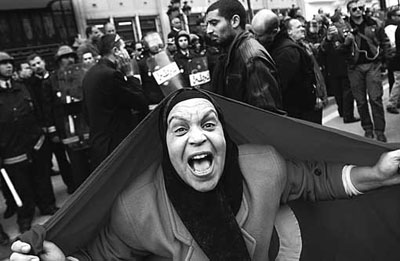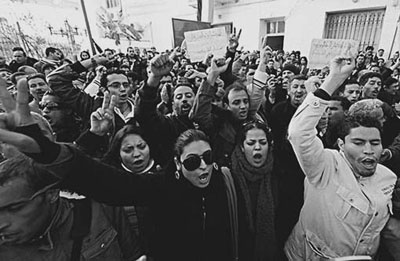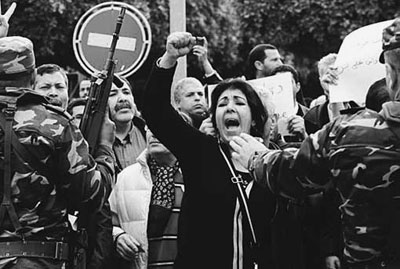"The revolution is not in the subjectivity of the enlightened minds, but it needs the collective action of lifting the masses of the insurgency. And the insurgency will always find itself faced with the strength of the established order that is shaping the hierarchical society, the strength of the state.
The revolution is thus not only an idea is also a fact, an event that takes place in history. The event meets the conditions of the society that produced it. Historical facts do not reproduce or never in the same way by the same conditions. And the revolutionary phenomenon is always multiple, several outbreaks of rebellion meets to transform a system into an image of the past: the old regime."
Eduardo Colombo (1) |
The year 2011 seems to have begun, among the many facts, with a horizon marked by insurgency that sees the world in the forefront of the Middle East. Before you turn on outbreaks of rebellion in Tunisia, then in Egypt, not to mention Algeria, Morocco, Yemen, Iran, Bahrain, Libya and now, with catastrophic repressive consequences shown to the world and the new horizons of war emerging in these last days.
The heads of the newspapers in the first months of this year and thicken with terms such as rebellion, revolution, insurrection. Used in most cases for one another, with little knowledge of the facts, with bias, sometimes tendentious news generated, fragments of reality that might just have done justice to the truth of the facts and have not been able, could, wanted to tell what really happened and is happening in that slice of the globe, but who have awakened, for a moment, the attention of Europe and the United States from its torpor and opulent consumerism.
All eyes on the riots in the streets of Tunis, in Tahrir Square in Cairo, Tehran and Tripoli as Begas, just to name a few. But there was as always, and which suggests that it is not random, a problem of interpretation.
"The popular uprisings in the Middle East and North Africa have been interpreted by the Europeans with a pattern of 30 years: the Islamic revolution in Iran. It is expected that the Islamist groups to take control of the protests are there to plot in the shadows, ready to seize power. The restraint and pragmatism of the Egyptian Muslim Brotherhood, however, worry and wonder: what happened to the Islamists? "Claimed in mid-February in an article O. Roy, journalist of the newspaper Le Monde, France.
At the dawn of the first mass protests, those where police and army violently suppressed hordes of protesters roaring with rage, the Western public opinion was shaken at first trying to brush up the terror alert and then, in an attempt to discredit the struggles that were screaming at great voice, they fleshed out the monster fed by fear of attacks Islamic hatred towards the West.
But the farce did not last, nor the story has a happy ending with the bad dictator expelled and "they all lived happily ever after."
Looking better to the protesters, in fact, it is clear that we are dealing with a post-islamist generation. For the people involved in the protests the great revolutionary movements of the seventies and eighties belong to another story, that of their parents. The new generation does not seem to be so interested in ideology: shouting slogans pragmatic and concrete (among the screams heard in the streets more often echoes the term "erhal": "away at once") and avoid references to Islam, as was the case in Algeria in the late 80's.
This generation refuses to claim the dictatorship and democracy. This does not mean that the protesters are all secular, or revolutionary, but just do not see in Islam a political ideology that can create a better order. That already is no small thing. First critical step to open a gate to the bacilli of cultural mutation that anarchists would like to engage in the bodies, but especially in the minds of others.
Another thing, even more amazingly, seem abandoned "conspiracy" theories they saw in countries like France, the United States all the causes of the ills of the Arab world. The pan-Arabism seems to have disappeared from the slogan, despite an undeniable spirit of emulation by Egyptians and Yemenis in the streets after the riots of the Tunisian brothers, but this was just a good, stimulating and spark to lift his head.

 the "revolutionary" subject
the "revolutionary" subject
We are dealing with a pluralistic generation, in which people are more individualistic, were able to construct a more complex process than that which their fathers could have created. These are people who are more educated than the parents, are more informed and often have access to modern means of communication that allow them to get in touch directly with other individuals without having to go through the political parties. History has taught to such children that have turned into Islamist regimes and dictatorships are not fascinated by Iran or Saudi Arabia. Those who took to the streets in Egypt are those that occur in Iran against Ahmadinejad. Probably they are believers, but this has nothing to do with their political demands. Manifest themselves in the name of dignity and respect, recalling a slogan that was born in Algeria in the late 90's and coincidentally reminding the watchwords of the indigenous movements of the center-revolutionary America, for example. They appeal to universal values, and want a democracy that has nothing to do with the one promoted by the Bush administration to justify the invasion of Iraq in 2003.
It is therefore wrong to link the Islamic revival in the last 30 years to a process of political radicalization. If Arab societies today seem to respect the Koran more than they did thirty years ago, how can we explain the absence of Islamic slogans in the event of recent months? Paradoxically, the social and cultural re-Islamization (wearing of the veil, the proliferation of mosques, spread of religious TV etc..) ended up de-politicizing Islam. The religious symbols have been emptied of any political value. The religious market was born here too. Everything becomes a Muslim, from fast food to women's fashion, and when everything is nothing is really religious.
At the same time and therefore the young people began to build their own individual path, religious or secular, where everyone builds their faith, their beliefs, their ideas, because the utopia of the Islamic state is no longer of interest to anyone, including the common people.
In any case, a revolt is not enough to make the revolution, consistent with its nature, the popular movement has no leader or political structures, and this raises the question of 'institutionalization of democracy. (See Castoriadis in "Relativism and Democracy")
What's more, and this is the crux on which I focus, in order to interpret these protests in a libertarian perspective, however, entering them into a yearning for freedom. In the words of Colombo: "The revolution is a will in action, an idea of social transformation taking place. (...) The revolutionary ideas eventually organize into a collective project of emancipation, an image of anticipation that contains the lines of force of a desired change, wanted or thought. When the revolution comes, the project itself will be transformed and upset. By definition, it belongs to the old society. But it is necessary for any change was a conscientious and driven by values and a purpose. The society does not expect the revolution to transform, they change constantly depending on the internal dynamics of a different set of internal conflicts that cross. However, the revolutionary change - even if it is the result of revolutions is aborted, killed, crushed - supposedly instrumental action related to values, human intentionality. Thus, a change driven by a project of liberation, or autonomy, driven by voluntary action, leading to a brittle-type revolutionary. "

 New mutual courtesy
New mutual courtesy
During the days of the uprising, the Egyptians discovered the pride of a society, citing the eye of an interesting article titled "The lightness of Cairo," Amira Hass, appeared on International No 885, year 18. And it is from reading this article that started the discussion that prompted me to reread and rethink what emerged from the workshop on 6 November to libertarians Research Center entitled "Revolution?", From which also quotes from Colombo and Ibañez.
At the outbreak of north Africa riots has reopened a chapter of history that for us is quite dated, but that place has the conscience to wonder if what was actually happening would lead to a revolution. Without intending the merits of a debate that might range from politics to philosophy, my answer came from this idea of narrative journalism.
"There was something a little lighter in the air when I arrived in Cairo on February 13. I wondered if it was just my imagination, but the feeling that this great city had been freed in a heavy cloak of lead has grown day by day and was confirmed by the people with whom I spoke. Even the Nile has become bluer, the people claimed after the resignation of Mubarak. A virtual blue, because this river is gray as before, and as always its vastness rhymes with generosity. With generosity and patience, the river has swallowed many canisters of tear gas, because the bridge was the best place to resist the attacks of police, thrown back in the river sticks. (...) The drivers seem to be more educated, women took to the streets without any problems, and even jokes have been reborn. "
(Amira Hass in Internazionale, num. 885, year 18, 18/24 February 2011)

An unexpected good education and a new comity were born during the weeks of revolt, people have started to take care of their city, cleaning up the trash, painting curbs or just sweeping the road with brooms brought from home, as for wanting to offend the regime, stating blatantly practical gestures with his full culpability in the oppression of the people, accusing him and relegating him to the neglect, indifference, the rudeness, filth, violence and poverty. And even more surprising that thousands and thousands of people have poured into the square without problems for women in the front row during the protests.
This is to reiterate that a revolution is also a profound cultural change, which involves primarily the aspect of daily life, the here and now, not necessarily in the near unidentified future. This concept emerges from the reflections of well Ibañez:
"It is no longer organize the militants, militant activity, to advance to the general uprising, but rather it is to revive and implement the Revolution today, here and now, within the means of combating that are developed collectively and in everyday life. The current revolutionary struggles are so clearly presented, but they are not all-encompassing. This is always due to the fact that the emphasis has shifted from future to present, which in turn has moved the whole of society towards partial but real situations. It is more action-oriented global and radical transformation of society as a whole that directs and makes the new revolutionary practice. The one that stands in the foreground is the will to break, now, the devices for specific and situated domain, is the action to create spaces that are radically foreign to the values of the system. It's about developing practices that, while a revolutionary turn in the villages of reality, transform ourselves and change our relations with others. This, however, goes hand in hand with practical anarchism by Colin Ward, creative and constructive anarchism is not so much a vision of the future but rather a way of life and organizations within the everyday present, with the idea of expanding like wildfire and contaminate their values gradually wider social sectors.. "

 Fights Group and revolutionary subjectivity
Fights Group and revolutionary subjectivity
A think globally but act local, each with their own specific features and cultural characteristics, but starting from the beginning to transform the existing, even in its banality as the example I want to do to close.
I found that reading in last fifteen years the Egyptians had not invented the most jokes. With the revolution, has also revived this popular tradition, hundreds of people in this period have their lines written on A4, posters, billboards, then performed to their comrades in arms and cameras. Symptom of a brain awakening and commitment in being able to play down and even harder to express the concepts with a smile. How to say "Will bury you a laugh."
This of course does not mean that the revolution is made, indeed, talk about riots, but soon reassembled upset the order between fragments and armies, up to the war. However, there is the certainty that the results obtained so far and if anything, the experience will help build a future worthy of the name.
"We must think of a historical process that takes place over many years, if not in centuries, modifying both the institutions of society as the kind of man who can bring it to life. But it's still a break, produced a profound change and a better society. The guillotine has sliced a tie that bound the body politic of the king to divine transcendence. These are the moments where the people insurgency broke into history, undermining and disrupting the imaginary determined that the backlash will appear this ridge line where the society falters. On the other hand, it is difficult to imagine that the powers of this world who have the job properties and weapons, to give up their privileges voluntarily. The revolt of the masses, the protean and probably iterative, it is a necessity of revolution. But for the revolutionary project to become an active social force, it must exit the level utopian idea to be embodied in collective dominant positions. The social conditions that will permit this embodiment, the revolutionaries I'm not sure teachers. " (2)
It is therefore to produce a political entity that is radically resistant to the kind of society in which we live, its values, relations of exploitation and domination that constitute it, and is therefore also in the subject that makes the Revolution. "In other words, the Revolution is also a subjective transformation in place, and the Revolution took shape when the collective struggles were born of revolutionary subjectivity."(3)
And that's what I hope happens in the Middle East.